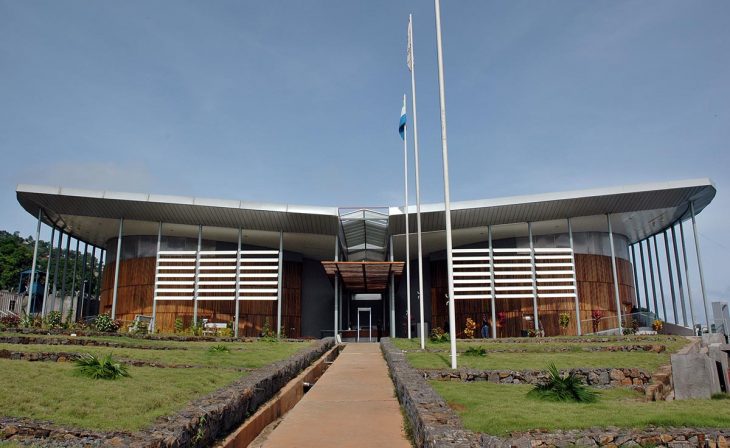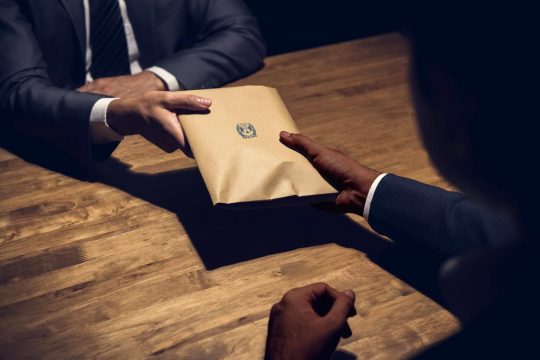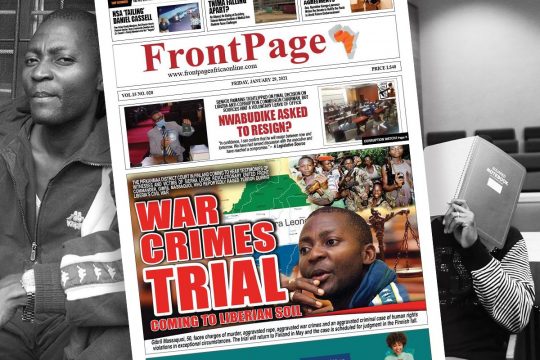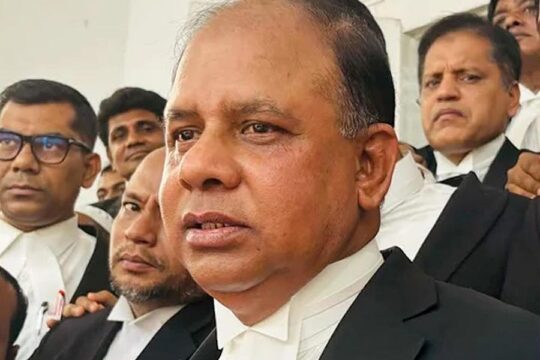Sitting in a quiet room on the ground floor, of the secret location booked for the Finnish Court, the gender sensitive panel of four judges, two of whom are women, have been presiding over the proceedings in a quiet and serene manner devoid of the adversarial aggressiveness between lawyers on both sides, which are hall marks of the British judicial system adopted by many African countries including Sierra Leone.
The trial had been delayed for a week, when two of the Finnish judges fell ill with typhoid as they flew in to Sierra Leone, from Liberia where they had been holding two months of hearings. There was thus the inevitable pressure to make up for lost time, ramping up the schedule with three witnesses per day and sitting through the weekend, Sunday inclusive.
Ms Paula Sallinen, the defence lawyer of the Sierra Leonean ex-commander of the Revolutionary United Front (RUF) Gibril Massaquoi – who himself follows the hearings from his prison in Finland – wasted no time in leading her first witness, watched attentively in a hawk like manner by two alert prosecutors – state prosecutor Tom Laitinen and district prosecutor Matias Londen – who seemed to hang on every phrase and every sentence.
Allegedly, the period of commission of the war crimes was between 1999 and 2003. “Defence witness n°4” began testifying that, in 1991, Massaquoi was in Pujehun District which borders Liberia. Along with a lot of youths, the accused had been captured, trained and conscripted into the RUF movement. In 1998, the witness said, the RUF leader Foday Sankoh asked all of the fighters to come out of the bush. Then, they joined the military and they were given offices at the headquarters at Cockeril, in the west-end of the capital Freetown.
Massaquoi was the spokesman of the RUF, and as a family member of the witness, “he used to strategize how to meet people and what to tell them” she said, and, in particular, to help her secure a local chieftaincy seat in his Massaquoi’s native village, Blama, in the Gallinese chiefdom, in this Pujehun district of Southern Sierra Leone. Towards the end of 1999, she said, he became more active. He visited and took part in monthly meetings on to 2001. But on 10th January 2002, they lost the chieftaincy elections and they all went back to Freetown.
A resident at Thunderhill in the east-end of the capital Freetown, Massaquoi’s only travel outside Freetown was to visit his mother once or twice a month in Bo, the second City, the witness said. In 2000 Massaquoi told her he had to travel to South Africa, Ivory Coast and Nigeria. She adds that in 2001, he went to Monrovia in Liberia and Nigeria. “I got to know this from his wife, who did not actually tell me everything”, the witness said.
The witness also told the prosecutor that she met Massaquoi at Youyi building, in Freetown, which houses majority of the government buildings in 2003, from where he moved around freely. Pressed by the prosecutor, who asked if by then Massaquoi was a protected witness with the Special Court for Sierra Leone, the witness answered “I don’t know that”.
Massaquoi travels in Guinea, Nigeria and Liberia
“Defence witness n°13”, a petroleum dealer, recalled when his friend Massaquoi was released from prison in 1999 and went on to live in Azzolini Highway, between the towns of Lunsar and Makeni in northern Sierra Leone. By then, the witness said he was fleeing for his life because he had been tagged as a collaborator of the RUF.
At that time, recounted the witness, Massaquoi was called by Sankoh in Lome for the signature of a peace agreement. He travelled through Guinea in November of 1999. A special assistant to Sankoh, he was with him after Lome when they went to Nigeria, where Sankoh was briefly arrested. Massaquoi came back to Freetown and worked, in 2000, as an administrative and legal adviser to Sankoh working at his residence in Spur road. Massaquoi himself lived in Murray Town, another suburb in Freetown, said witness n°13.
On May 8th 2000, a civil populace went to Sankoh’s house at Spur road. Massaquoi escaped. Sankoh was arrested. The witness said he met Massaquoi at his residence, who “was grumbling that his colleagues had attacked some peacekeepers” and was blaming two other RUF leaders, Issa Sesay and Morris Kallon, saying they had “put our lives in danger with these hostages.” The leadership of the RUF was transferred to Sesay, a battlefield commander, and Massaquoi lead a delegation that went to Liberia. He was charged “to deliver the peacekeepers to the Liberian president Charles Taylor” and, according to the witness, he stayed in Liberia for six months before returning to his residence in Makeni.
Sesay and Rambo vs Massaquoi and Superman
In 2001, Massaquoi joined the so-called Tripartite Peace meetings between the RUF and the government of Sierra Leone mediated by the United Nations. The meetings were held in Sierra Leone’s cities of Kailahun, Kono, and Kambia. By then he was spokesman for the RUF and took part in all the meetings. In Makeni there was what the witness called “a fight for supremacy” between two factions of the RUF. There was Sesay and ‘Rambo’ on the one hand, and Massaquoi and Dennis Mingo alias Superman on the other hand. At one point, recounted the witness, the fight between the factions resulted in the death of ‘Rambo.’
Massaquoi lived in Makeni up to 2002, when some people came from Guinea “with a money doubling scam”, said the witness. The guys duped Sesay, so he arrested Massaquoi and tied him up because he had introduced the scammers to him. A Nigerian commander in the area, colonel Oladipo stepped in and called for the UN helicopter which took Massaquoi to the UN Headquarters at Mammy Yoko (now Radisson Blu) hotel in Freetown. Defence witness n°13 says he directed the Criminal Investigations Department to arrest one of the scammers. He brought Massaquoi’s wife and children to live with him in Freetown.
By 2002 to 2003, a “disarmament demobilization and reintegration program” started and they gave Massaquoi a fishing project costing $10,000, continued the witness. “It was a blanket project for all RUF Commanders to help bring them on board the peace process.” It was then, the witness added, that Massaquoi came across a chief investigator at the UN Special Court for Sierra Leone, Alan White, who hired him to give information. From 2003 upwards, Massaquoi became an informer for the Court, who paid the rent for his residence and provided security for him. Soon after, the witness said, Sesay and Kallon were arrested.







